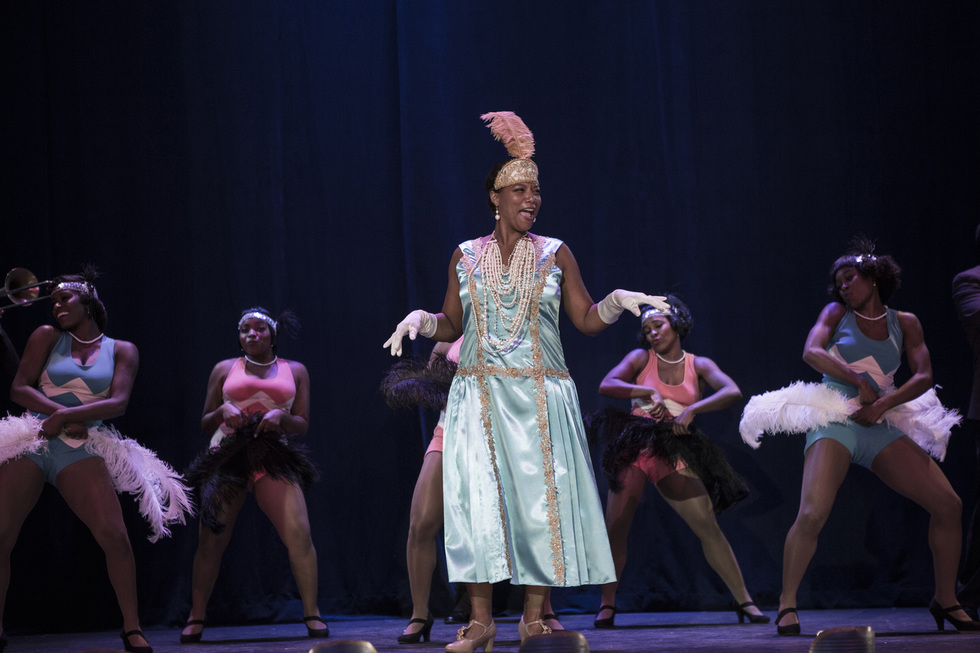
BY MATTHEW ENG |
Why You Need to Catch Up with HBO's Bessie Smith Biopic Starring Queen Latifah

Dee Rees' Bessie, a biopic about the eponymous jazz legend Bessie Smith, premiered on HBO this Saturday to favorable reviews and loads of anticipation for Rees' follow up to 2011's deft and devastating coming-of-age drama Pariah, as well as a front-and-center star turn from Queen Latifah as the Empress of Blues herself.
Because HBO's viewing strategies are both awesomely vast and almost comically easy -- don't pretend you weren't just watching Veep on your friend's roommate's cousin's HBO GO account -- we hope you'll check out Bessie if you have yet to. And for those who still have reservations -- although why is that, exactly? -- here are a few more reasons to tune into this all-too rare entity: a wondrous, warts-and-all portrayal of a complex and iconic woman of color...

Did I mention this thing stars The Queen?
It's infinitely refreshing to see Queen Latifah attack a scintillatingly substantial lead role after years of milling about in voice parts and near-cameos in forgettable fluff that do nothing with her boundless onscreen charisma. It's even more refreshing to see the Queen disappear into the skin of a seminal, trailblazing figure of African-American entertainment history, exploring the blemishes, mysteries, and psychological minutiae of the very real woman behind the legacy. If she doesn't sell you on Bessie then I assume nothing will.

Plus, she has good backup.
Rees has assembled an enviable squad of talented black performers including The Wire's ever-versatile Michael Kenneth Williams (Omar!) as Bessie's exasperated, volatile husband; Khandi Alexander (Scandal's Mama Pope), employing her redoubtable talent for piano-wire tension as Smith's bitter older sister; the moving Tory Kittles as her devoted brother; Mike Epps and Tika Sumpter as sidelined partners in Smith's bisexual romantic history; and, I write this with tremendous excitement, Mo'Nique as famed blues mistress and Smith's mentor Ma Rainey. Let me write it again: Mo. 'Nique. In only her second project after delivering one of the greatest screen performances of all time in Precious. Singing. Dancing. Fan-twirling:

I totally understand if you've stopped reading this to watch Bessie. It's an appropriate response.

Dee Rees is a rising talent to keep serious tabs on.
For anyone who saw Rees' shattering narrative film debut Pariah in 2011, Bessie should be obvious viewing. The story of a black female teen struggling to conceal her sexual identity from her deteriorating Brooklyn family, Pariah is a thing of true and touching beauty, the rare film to treat the chaos and curiosity of young, queer girlhood with all the smarts and sincerity these stories warrant but so seldom receive -- that is, when they're even told at all. I can't recommend it enough, and it's thrilling to see Rees, a sensitive writer and witty visual storyteller, grab such a high-profile gig on the strengths of this brilliant, breakthrough indie. One can only hope that Bessie is the first in a long line of directing opportunities for Rees, and by the look of things, it will be.
Sure, biopics can be a chore. But this one isn't.
Yes, you have probably seen numerous biofilms set in similar milieus as Bessie, attuned to similar insights about fame and music, and shaped around similar narrative progressions that stories about downward-spiraling artists tend to take.
But Bessie's racial politics, its feminist leanings, the united efforts of the formidable talents involved both in front of the camera and behind it, and, first and foremost, the life, legend, and radicalism of who this movie is about are all ample reasons to at least give this project a glance.
Black cinema, like black stories, black womanhood, and black lives, matter, and should be embraced and celebrated by all audiences. Why not start here?
